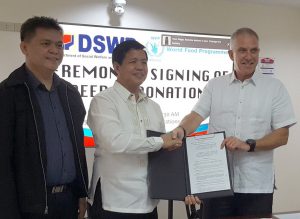
In a simple ceremony, Department of Social Welfare and Development (DSWD) Secretary Rolando Joselito D. Bautista and United Nations World Food Programme (UN-WFP) Country Director Stephen Gluning signed last week the deed of donation formally handing over the ownership of a mechanized production system to DSWD.
The mechanized production system was installed and launched in April 2016 at the Visayas Disaster Response Center (VDRC) in Mandaue City, Cebu.
The mechanized production system is composed of equipment which automates and streamlines the production of family food packs (FFPs) so the DSWD can quickly and efficiently provide relief resources to local government units (LGUs) around the country.
The project is one of the results of the strategic partnership between the DSWD and WFP aimed at enhancing the emergency response capacity in the Philippines. With the installation of the mechanized production system, the production rate of family food packs has reached 50,000 packs in a day which is enough to feed 250,000 people for three days.
The DSWD saw the usefulness of the machine during the last strong typhoons as the Department was able to deliver almost immediately family food packs to Filipinos in need because the system of preparing them was very efficient and mechanized.
It has also introduced the innovative way of packing goods from plastic to boxes which is now more convenient and environment-friendly.
As part of the partnership, the first mechanized production system was installed at the National Resource Operations Center (NROC) in Pasay City.
Sec. Bautista expressed the Department’s sincere gratitude for the generosity of UN-WFP.
Sec. Bautista added, “It would be great if we can establish another disaster production center in Mindanao, which we hope that WFP can also help us with.”
In response, Country Dir. Gluning expressed his joy for the realization of the project and said that he looks forward to the continuation of the friendship and partnership.
“I think there is a great deal of opportunities in Mindanao and Luzon, and in our continued partnership, it is something we can achieve in the future,” he said.
Country Dir. Gluning continued, “The Philippines is a beautiful island state, which has the problem of being located at the ring of fire and is visited by numerous typhoons yearly. With the system, we are now seeing that the impact of natural hazards is being reduced. However, we can still better prepare, better respond, and we can still do more.”
“The reward we get from this partnership is that more affected families will not go to sleep hungry. And for us responders, we can also sleep peacefully knowing that we were able to give the assistance that disaster survivors deserve,” Sec. Bautista concluded. ###


